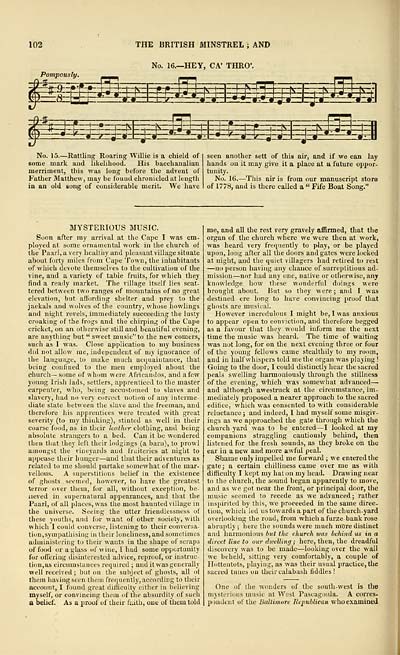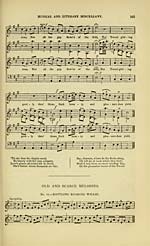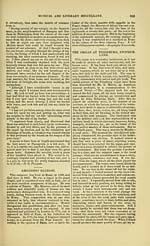Glen Collection of printed music > Printed music > British minstrel, and musical and literary miscellany
(440) Page 102 - Hey, ca' thro'
Download files
Complete book:
Individual page:
Thumbnail gallery: Grid view | List view

102
THE BRITISH MINSTREL ; AND
Pompously.
-9A-
-1^-
No. 16— HEY, CA' THRO'.
m
ITT-
^eS^^e^
qzric
:p=q==fs
=5£?
SE
JZ=^=lL
:i=tE
jtjzz^zi:
?
No. 15. — Rattling Roaring Willie is a chield of
6ome mark and likelihood. His bacchanalian
merriment, this was long before the advent of
Father Matthew, may be found chronicled at length
in an old iong of considerable merit. We have
seen another sett of tins air, and if we can lay
liands on it may give it a place at a future oppor-
tunity.
No. 16. — Tills air is from our manuscript store
of 1778, and is there called a " Fife Boat Song."
MYSTERIOUS MUSIC.
Soon after my arrival at the Cape I was em.
ployed at some ornamental work in the church of
the Pilar), a very healtiiy and pleasant village situate
about forty miles from Cape Town, the inhabitants
of wliich devote themselves to the cultivation of the
vine, and a variety of table fruits, for which they
find a ready market. The village itself lies scat-
tered between two ranges of mountains of no great
elevation, but atl'ording shelter and prey to the
jackals and wolves of the country, whose bowlings
and night revels, immediately succeeding the lusty
croaking of the frogs and tlie chirping of the Cape
cricket, on an otherwise still and beautiful evening,
are anything but " sweet music" to the new comers,
such as I was. Close application to my business
did not allow me, independent of my ignorance of
the language, to make much acquaintance, that
being confined to the men employed about the
church— some of whom were African Jos, and a few
young Irisli lads, settlers, apprenticed to the master
carpenter, who, being accustomed to slaies and
slavery, had no very correct notion of any interme-
diate state between the slave and the freeman, and
therefore his apprentices were treated with great
severity (to my thinking), stinted as well in their
coarse food, as in their laither clothing, and being
absolute strangers to a bed. Can it be wondered
then that they left their lodgings (a barn), to prowl
amongst the vineyards aud fruiteries at night to
appease their bunger^and that their adventures as
related to me should partake somewhat of the mar-
vellous. A superstitious belief in the existence
of ghosts seemed, however, to have the greatest
terror over them, for all, without exception, be-
lieved in supernatural appearances, and that the
Paarl, of all places, was the most haunted village in
the universe. Seeing the utter friendlessness of
these youths, and for want of other society, with
which I could c(mverse, listening to their conversa-
tion, sympathising in their loneliness, and sometimes
administering to tiieir wants in the shape of scraps
of food or a glass of wine, I had some opportunity
for ofl'ering disinterested advice, reproof, or instruc-
tion,as circumstances required; and it was generally
well received; but on the subject of ghosts, all oi
them having seen thein frequently, according to their
account, I found great ditticulty either in believing
myself, or convincing them of the absurdity of such
a belief. As a proof uf their faith, cue of them told
me, and all the rest very gravely affirmed, that the
organ of the church where we were then at work,
was heard very frequently to play, or be played
uijon, long after all the doors and gates were locked
at night, and the quiet villagers had retired to rest
— no person having any chance of surreptitious ad-
mission — nor had any one, native or otherwise, any
knowledge how these wonderful doings were
brought about. But so they were ; and I was
destined ere long to have convincing proof that
ghosts are musical.
However incredulous I might be, I was anxious
to appear open to conviction, and therefore begged
as a favour that they would inform me the next
time the music was heard. The time of waiting
was not long, for on the next evening tliree or four
of the young fellows came stealthily to my room,
and in half whispers told me the organ was playing !
Going to the door, I could distinctly hear the sacred
peals swelling harmoniously through the stillness
of the evening, which was somewhat advanced —
and although awestruck at the circumstance, im-
mediately proposed a nearer approach to the sacred
edifice, which was consented to with considerable
reluctance ; and indeed, I had myself some misgiv-
ings as we approached the gate through which the
church yard was to be entered — I looked at my
companions straggling cautiously behind, then
listened for the fresh sounds, as they broke on the
ear in a new and more awful peal.
Shame only impelled me forward ; we entered the
gate; a certain chilliness came over me as with
difficulty I kept my baton my head. Drawing near
to the eiiurch, the sound began apparently to move,
and as we got neat the front, or principal door, the
music seemed to recede as we advanced; rather
inspirited by this, we proceeded in the same direc-
tion, which led ustowardsapart of the church-yard
overlooking the road, from which a furze-bank rose
abruptly ; here the sounds were much more distinct
and harmonious but the church was behind jis in a
direct line to our dwelling ; here, then, the dreadful
discovery was to be made — looking over the wall
we beheld, sitting very comfortably, a couple of
Hottentots, playing, as was their usual practice, the
sacred tunes on their calabash fiddles !
One of the wonders of the south-west is the
mysterious music at West Pascagoula. A corres-
pondent of the Baltimore Republican who examined
THE BRITISH MINSTREL ; AND
Pompously.
-9A-
-1^-
No. 16— HEY, CA' THRO'.
m
ITT-
^eS^^e^
qzric
:p=q==fs
=5£?
SE
JZ=^=lL
:i=tE
jtjzz^zi:
?
No. 15. — Rattling Roaring Willie is a chield of
6ome mark and likelihood. His bacchanalian
merriment, this was long before the advent of
Father Matthew, may be found chronicled at length
in an old iong of considerable merit. We have
seen another sett of tins air, and if we can lay
liands on it may give it a place at a future oppor-
tunity.
No. 16. — Tills air is from our manuscript store
of 1778, and is there called a " Fife Boat Song."
MYSTERIOUS MUSIC.
Soon after my arrival at the Cape I was em.
ployed at some ornamental work in the church of
the Pilar), a very healtiiy and pleasant village situate
about forty miles from Cape Town, the inhabitants
of wliich devote themselves to the cultivation of the
vine, and a variety of table fruits, for which they
find a ready market. The village itself lies scat-
tered between two ranges of mountains of no great
elevation, but atl'ording shelter and prey to the
jackals and wolves of the country, whose bowlings
and night revels, immediately succeeding the lusty
croaking of the frogs and tlie chirping of the Cape
cricket, on an otherwise still and beautiful evening,
are anything but " sweet music" to the new comers,
such as I was. Close application to my business
did not allow me, independent of my ignorance of
the language, to make much acquaintance, that
being confined to the men employed about the
church— some of whom were African Jos, and a few
young Irisli lads, settlers, apprenticed to the master
carpenter, who, being accustomed to slaies and
slavery, had no very correct notion of any interme-
diate state between the slave and the freeman, and
therefore his apprentices were treated with great
severity (to my thinking), stinted as well in their
coarse food, as in their laither clothing, and being
absolute strangers to a bed. Can it be wondered
then that they left their lodgings (a barn), to prowl
amongst the vineyards aud fruiteries at night to
appease their bunger^and that their adventures as
related to me should partake somewhat of the mar-
vellous. A superstitious belief in the existence
of ghosts seemed, however, to have the greatest
terror over them, for all, without exception, be-
lieved in supernatural appearances, and that the
Paarl, of all places, was the most haunted village in
the universe. Seeing the utter friendlessness of
these youths, and for want of other society, with
which I could c(mverse, listening to their conversa-
tion, sympathising in their loneliness, and sometimes
administering to tiieir wants in the shape of scraps
of food or a glass of wine, I had some opportunity
for ofl'ering disinterested advice, reproof, or instruc-
tion,as circumstances required; and it was generally
well received; but on the subject of ghosts, all oi
them having seen thein frequently, according to their
account, I found great ditticulty either in believing
myself, or convincing them of the absurdity of such
a belief. As a proof uf their faith, cue of them told
me, and all the rest very gravely affirmed, that the
organ of the church where we were then at work,
was heard very frequently to play, or be played
uijon, long after all the doors and gates were locked
at night, and the quiet villagers had retired to rest
— no person having any chance of surreptitious ad-
mission — nor had any one, native or otherwise, any
knowledge how these wonderful doings were
brought about. But so they were ; and I was
destined ere long to have convincing proof that
ghosts are musical.
However incredulous I might be, I was anxious
to appear open to conviction, and therefore begged
as a favour that they would inform me the next
time the music was heard. The time of waiting
was not long, for on the next evening tliree or four
of the young fellows came stealthily to my room,
and in half whispers told me the organ was playing !
Going to the door, I could distinctly hear the sacred
peals swelling harmoniously through the stillness
of the evening, which was somewhat advanced —
and although awestruck at the circumstance, im-
mediately proposed a nearer approach to the sacred
edifice, which was consented to with considerable
reluctance ; and indeed, I had myself some misgiv-
ings as we approached the gate through which the
church yard was to be entered — I looked at my
companions straggling cautiously behind, then
listened for the fresh sounds, as they broke on the
ear in a new and more awful peal.
Shame only impelled me forward ; we entered the
gate; a certain chilliness came over me as with
difficulty I kept my baton my head. Drawing near
to the eiiurch, the sound began apparently to move,
and as we got neat the front, or principal door, the
music seemed to recede as we advanced; rather
inspirited by this, we proceeded in the same direc-
tion, which led ustowardsapart of the church-yard
overlooking the road, from which a furze-bank rose
abruptly ; here the sounds were much more distinct
and harmonious but the church was behind jis in a
direct line to our dwelling ; here, then, the dreadful
discovery was to be made — looking over the wall
we beheld, sitting very comfortably, a couple of
Hottentots, playing, as was their usual practice, the
sacred tunes on their calabash fiddles !
One of the wonders of the south-west is the
mysterious music at West Pascagoula. A corres-
pondent of the Baltimore Republican who examined
Set display mode to: Large image | Transcription
Images and transcriptions on this page, including medium image downloads, may be used under the Creative Commons Attribution 4.0 International Licence unless otherwise stated. ![]()
| Special collections of printed music > Glen Collection of printed music > Printed music > British minstrel, and musical and literary miscellany > (440) Page 102 - Hey, ca' thro' |
|---|
| Permanent URL | https://digital.nls.uk/91440225 |
|---|
| Description | Scottish songs and music of the 18th and early 19th centuries, including music for the Highland bagpipe. These are selected items from the collection of John Glen (1833 to 1904). Also includes a few manuscripts, some treatises, and other books on the subject. |
|---|
| Description | The Glen Collection and the Inglis Collection represent mainly 18th and 19th century Scottish music, including Scottish songs. The collections of Berlioz and Verdi collected by bibliographer Cecil Hopkinson contain contemporary and later editions of the works of the two composers Berlioz and Verdi. |
|---|

